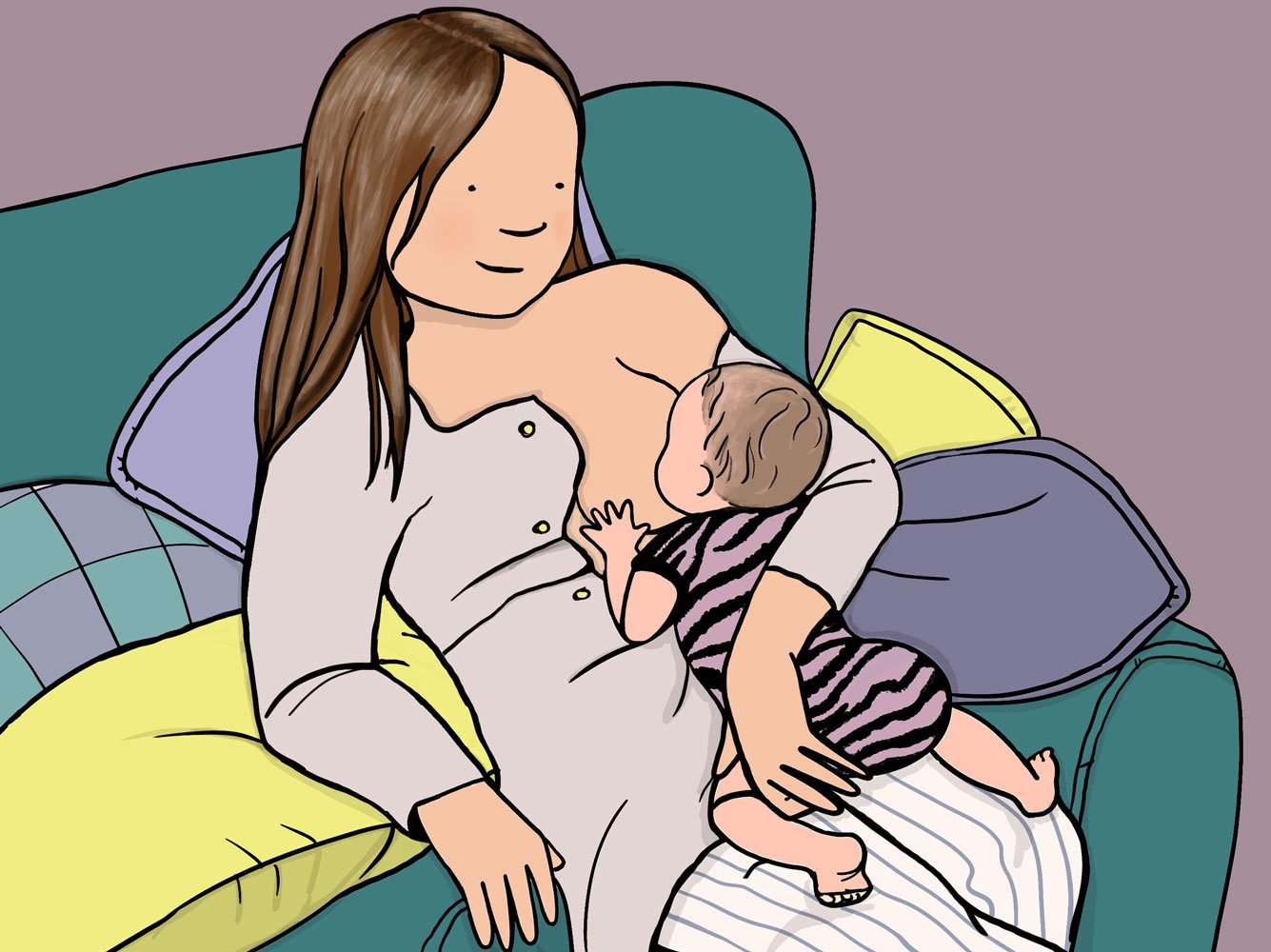Breastfeeding positions
There is no one position to use to breastfeed your baby. What works well for one breastfeeding mother and baby may not work for another. What worked with one of your baby’s may not work for another. In addition, you may find some positions work better for you at different stages of your breastfeeding journey and for different times of the day or night.
How to tell if breastfeeding your new baby is going well?
In the UK as many as 81% of mothers initiate breastfeeding, however by 6 weeks of life only 55% are still doing any breastfeeding at all. Something is amiss. As a lactation consultant is important for me to empower families in the antenatal period to understand how breastfeeding works, know the practicalities of breastfeeding new-borns and to know how to tell it is going well.
How to start weaning?
Starting solid foods is an exciting time. It is a new phase in your baby’s development one that you understandably want to embrace, but how do you do it? What are the practical steps you need to take?
Why is my breastfeeding baby refusing a bottle?
Bottle refusal in breastfed babies is a common phenomenon and for those families who choose for a bottle to feature as part of their breastfeeding journey it can be highly frustrating to be met with a baby who won’t take the bottle.
Supplemental Nursing System
Colostrum Harvesting or Antenatal Hand Expressing is collecting your colostrum before your baby arrives.
Colostrum is the first milk your body makes for your baby, it’s packed full of calories, antibodies & growth factors.
Antenatal Colostrum Harvesting
Colostrum Harvesting or Antenatal Hand Expressing is collecting your colostrum before your baby arrives.
Colostrum is the first milk your body makes for your baby, it’s packed full of calories, antibodies & growth factors.
Feeding in slings/carriers
Carrying or babywearing is typically used to describe the act of supporting your child on your body using fabric or other means giving you your hands back. Although sometimes you may support them with your hands as well so that is usually called in arms carrying. Essentially carrying is a tool and it is something that can be useful for everyone.
Breastfeeding and teeth
The effect of teeth on the breastfeeding relationship will very likely vary from day to day. I speak from experience when I say this. I had no awareness of my first erupting teeth and it had no impact on our breastfeeding, however with my second I was very aware, it affected his latch at times and he was prone to biting when teething.
Breastfeeding with large breasts
It’s often assumed that women with larger breasts will produce more milk and that having large breasts is therefore an advantage when you’re breastfeeding. In fact, there’s no correlation between the size of a woman’s breasts and her milk production. Women with larger breasts have more fatty tissue, not more glandular tissue, and the latter is where milk is produced.
Help! My breastfed baby won’t take a bottle
Breast fed babies do not need to learn to bottle feed. However there may be circumstances where for personal reasons they may prefer their infant to take a bottle here and there. And this blog is for families who have made that choice but who are struggling to get their baby to accept a bottle.
Feeding Trauma
I support families of children who have feeding difficulties, I also support many parents, usually mothers, who feel low and isolated and who tell me they feel they feel helpless or that they are failing. It is important to me to always talk to families about how they are feeling and the journey they have been are on as I strongly believe that families can be traumatised by challenging early feeding experiences and that part of my role is to listen and help.
Feeding with a tongue tie
What is a tongue tie?
A tongue tie, also known as ankylogossia is where the small strip of tissue known as the lingual frenulum, which connects the tongue to the floor of mouth, is too short, too tight or too close to the gum ridge.
When this occurs, it can impact on tongue movement, which in turn can impact on the feeding process.
There are two types of tongue tie, anterior and posterior
Feeding with Down's syndrome
I met Sam during my time studying for my IBCLC lactation consultant qualification. Sam was pregnant at the time. She gave birth to her gorgeous daughter Roisin in 2019. Roisin has Down syndrome. In order to raise awareness of Down's syndrome on World Down syndrome day 2020, Sam is sharing her feeding journey.
Feeding infants with gastro-oesophageal reflux
If you are struggling to feed your baby who you think may have reflux then this article is for you.
Gastro-oesophageal reflux (GOR) is a normal process where the contents of the stomach can come back up out of the stomach into the oesophagus and mouth. This affects babies, children and adults. In babies this can look like the effortless positing and regurgitation of feeds. In some cases, the symptoms are much more severe and may need treatment of some kind. This is known as Gastro-oesophageal reflux disease (GORD).
Feeding difficulties and Cow's Milk Allergy
ow's milk allergy (CMA) is the leading cause of food allergy in children under 3 years of age. It is thought to peak in the first year of life, with true CMA affecting 2-3% of the infant population.
CMA can be IgE or Non-IgE mediated or a mixture of both. IgE mediated allergy will present as an immediate reaction to the milk protein and your child may develop hives or breathing difficulties
How to manage going back to work when you are breastfeeding.
If you would you like to continue to breastfeed your baby or toddler once you go back to paid employment, but aren’t sure how to make it work, this article is for you.
Getting a deep latch
A shallow latch is a common cause of pain during breastfeeding in the early days and weeks.
What is a shallow latch?
A shallow latch occurs when your baby doesn’t take a large enough mouthful of breast tissue into its mouth when latching. As a result your nipple
Feeding with bronchiolitis
This winter I have had a number of contacts from mothers of babies who have contracted bronchiolitis and who have needed support and advice with breastfeeding, bottle feeding, expressing and tube feeding during their babies’ illness. I am writing this blog to be a go to for any mum who may find herself with a baby with bronchiolitis and who needs access to feeding advice.
Low milk supply
Did you know that only around 1% of mothers are physically unable to make enough milk for their babies?
The most common conditions or circumstances which may impact on a mothers’ ability to produce milk include;
Polycystic Ovarian Syndrome (PCOS) - only 20% of women with this condition are likely to struggle with supply.
Insufficient glandular tissue




















